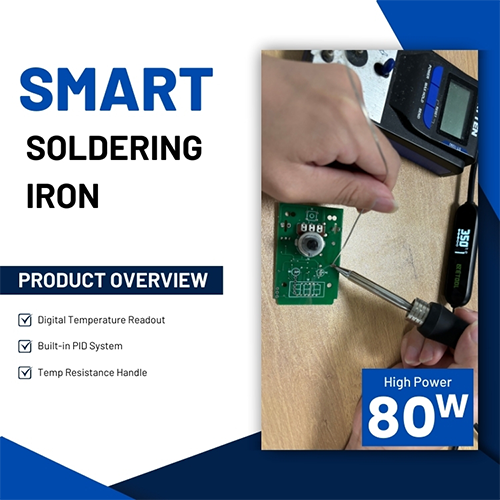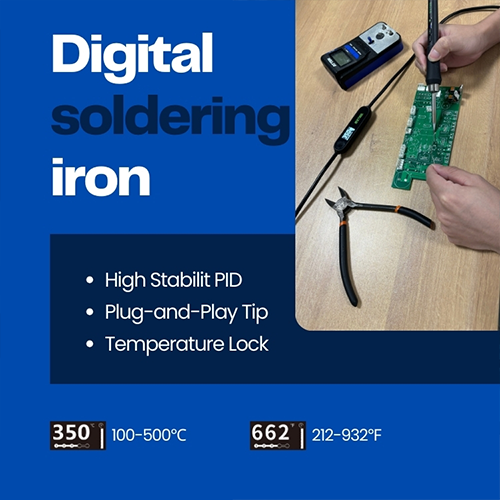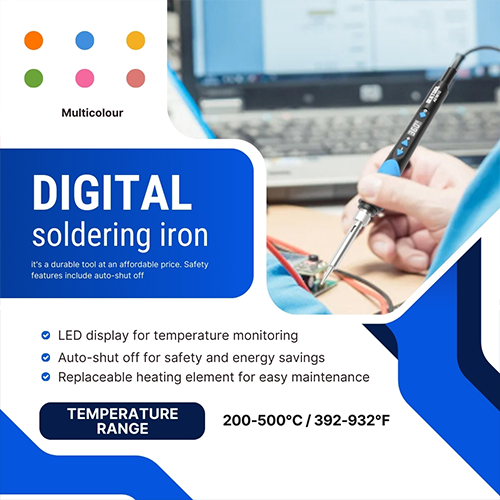
Soldering, the delicate art of joining metals with molten solder, is a fundamental skill in countless industries and hobbies. From electronics enthusiasts to professional repair technicians, a reliable soldering iron is an indispensable tool. But not all soldering irons are created equal. In this comprehensive guide, we'll delve into the world of professional soldering irons, exploring what sets them apart, how to choose the right one, and best practices for achieving flawless solder joints.
Whether you're a seasoned pro or just starting your soldering journey, this article will equip you with the knowledge and confidence to make informed decisions and elevate your soldering game.
Let's dive in!
You've heard the term "professional soldering iron" tossed around, but what does it really mean? Let's break it down.
Imagine a soldering iron as a tiny, magical welding wand. Now, picture a hobbyist's wand - fun, simple, and perfect for small projects. A professional soldering iron is like the wand of a seasoned wizard. It's crafted with precision, power, and control in mind. It's the tool that separates the hobbyist from the pro.
A pro soldering iron is built for durability, speed, and accuracy. It's got a beefy heating element to tackle tough jobs, and its temperature can be dialed in with surgical precision. And let's not forget the tip - the business end of this magical tool. Professional irons come with a variety of tip shapes and sizes, each designed for specific tasks. It's like having a whole toolbox of wand tips at your disposal!

Alright, so you've got a basic understanding of what a professional soldering iron is. But why do you need one? Let's talk about the perks.
First off, precision is king. When you're dealing with delicate components or complex circuits, a hobbyist iron just won't cut it. A pro iron gives you the control you need to create flawless solder joints every time. No more cold solder joints or burnt components!
Secondly, time is money. If you're making a living with your soldering skills, you can't afford to be slowed down by a wimpy iron. A professional tool heats up faster, cools down quicker, and lasts longer, saving you precious time and effort.
Finally, a professional soldering iron is a sign of your expertise. It shows your clients or customers that you're serious about your craft and committed to delivering top-notch results.
Let's face it - you wouldn't use a toy hammer to build a house, right? The same goes for soldering. If you want to be taken seriously, you need the right tools for the job.
A professional soldering iron is packed with features that make it a cut above the rest. Let's dive into what sets them apart.
Temperature Control: Imagine trying to bake a cake without an oven thermometer. Disaster, right? The same goes for soldering. A pro iron lets you dial in the exact temperature you need for different materials and components. No more guessing or risking overheating delicate parts.
Tip Types: Just like a skilled chef has a knife for every task, a professional soldering iron has a tip for every job. From fine-tipped needles for tiny components to wide chisels for heavy-duty connections, you'll find the perfect tip for any challenge.
Power and Wattage: Think of wattage as the muscle behind your soldering iron. Professional models pack a punch, ensuring consistent heat output even during demanding tasks. You won't be fighting for enough heat when you need it most.
Ergonomics and Comfort: Soldering can be a repetitive task, so comfort is key. Professional irons are designed with your well-being in mind, featuring ergonomic handles and lightweight construction to reduce hand fatigue.
Safety Features: Safety first! Professional soldering irons come equipped with features like insulated handles, tip holders, and ground connections to protect you from burns and electrical shocks.
Picking the perfect professional soldering iron is like choosing the right tool for the job. Let's break down the decision-making process.
First, think about what you'll be soldering. Are you working with tiny electronics or heavy-duty metalwork? This will help you determine the ideal temperature range, tip size, and wattage.
Next, consider your budget. Professional soldering irons come in a wide range of prices. Decide how much you're willing to invest and look for features that match your needs and budget.
Brand reputation also matters. Look for established brands with a history of producing quality tools. You want an iron that will last, right?
Finally, don't be afraid to ask around. Talk to other professionals in your field or join online communities to get recommendations and insights.
Remember, choosing the right soldering iron is an investment in your work. Take the time to find the perfect tool for your needs.
Now that you've got your hands on a professional soldering iron, it's time to put it to work! Here are some tips to help you create those perfect solder joints.
First, master the basics. Hold the iron at the correct angle, apply the solder to the joint, and let the heat do the work. Avoid overheating components and using too much solder.
Experiment with different soldering techniques like pre-tinning and wicking to find what works best for you. And remember, practice makes perfect!

Just like any precision tool, your soldering iron needs proper care to maintain its performance.
Regular cleaning is essential. Use a damp sponge or a tip cleaner to remove residue and oxidation. Tinning the tip regularly helps protect it from corrosion.
When you're not using your iron, store it safely in a tip holder to prevent damage.
If you encounter issues like inconsistent heating or tip problems, troubleshoot the issue or contact the manufacturer for support.
By following these tips, you can extend the life of your soldering iron and ensure it continues to deliver top-notch results.
Wondering if you really need a professional soldering iron? Let's compare it to its hobbyist counterpart.
Hobbyist soldering irons are great for simple projects and occasional use. They're usually cheaper, but they often lack the precision, power, and durability of professional models.

Professional soldering irons, on the other hand, are built for heavy-duty use and demanding tasks. They offer superior temperature control, a wider range of tip options, and longer lifespan.
If you're a serious hobbyist or professional, investing in a professional soldering iron is a wise choice. It will save you time, frustration, and potentially even money in the long run.
Investing in a professional soldering iron is a game-changer for anyone serious about electronics, repair work, or crafting. With its precision, power, and durability, it's the go-to tool for achieving professional-quality results.
Remember, the key to successful soldering lies not only in the equipment but also in proper technique and care. By following the best practices outlined in this article and continuously honing your skills, you'll be well on your way to becoming a soldering master.
The wattage of your soldering iron depends on what you're soldering. For delicate electronics, a lower wattage (around 25-40 watts) is ideal. For heavier-duty work, you might need a higher wattage (60-80 watts or more). Remember, a professional soldering iron often has adjustable wattage settings, giving you flexibility for different tasks.
Choosing the right soldering tip is crucial for precision and heat transfer. Consider the size and shape of the components you're working with. A chisel tip is versatile, but there are also cone, bevel, and other specialized tips for specific tasks. Experiment with different tip shapes to find what works best for you.
Absolutely! Lead-free solder is the preferred choice for most electronics work due to environmental and health concerns. Professional soldering irons are designed to work with both lead-free and leaded solder.
Regular tip cleaning is essential for optimal performance. Use a damp sponge or a specialized tip cleaner to remove oxidation and residue. For stubborn buildup, a brass wire brush can be helpful. Tinning the tip with solder after cleaning helps protect it from corrosion.
Safety is paramount when working with soldering irons. Here are some essential precautions:
Wear safety glasses to protect your eyes from solder splatters.
Use a well-ventilated area to avoid inhaling fumes.
Avoid touching hot surfaces.
Use a heat-resistant mat to protect your workspace.
Unplug the soldering iron when not in use.
Contact: Karen
Phone: (0086) 755 2340 8754 ext. 807
E-mail: atetool@atetool.com.cn
Add: 5F, 1-2# Building, Tongfuyu Industrial Zone, Aiqun Rd, Shiyan Subdistrict, Bao'an, Shenzhen, 518108, China